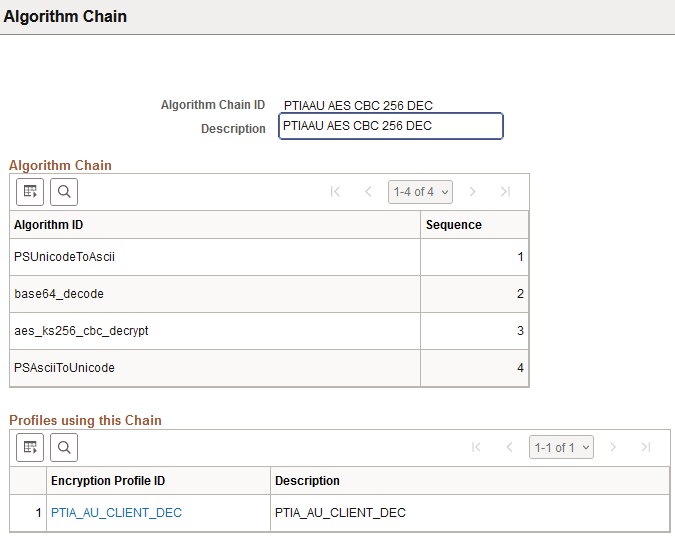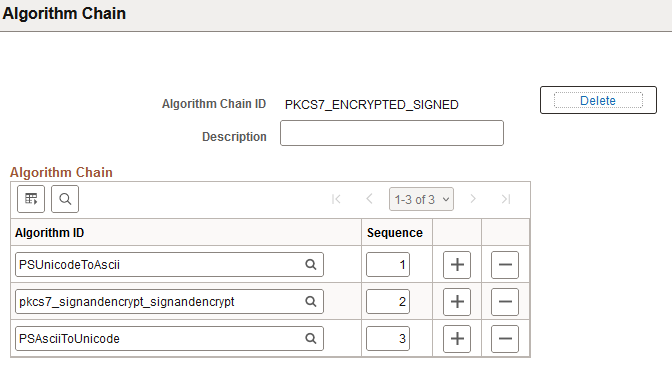Defining Algorithm Chains
Access the Algorithm Chain page ().
The page changes depending upon whether the algorithm chain is being used by any encryption profile.
This example illustrates the fields and controls on the Algorithm Chain page for an algorithm chain used in an encryption profile.

This example illustrates the fields and controls on the Algorithm Chain page for an algorithm chain not used in an encryption profile.

|
Field or Control |
Description |
|---|---|
|
Algorithm ID |
The grid lists the algorithms included in the chain and their sequence number. Click the plus button to add algorithms. |
|
Profiles using this Chain |
This grid appears for algorithm chains that are used in an encryption profile. The page displays all encryption profiles that are implemented using this algorithm chain. Select the Encryption Profile ID link to open the Administer Encryption Profile page for the selected profile. |
|
Delete |
You can only delete chains that are not used by any encryption profile. |
Considerations for Unicode and ASCII Text Formats
Although you can select any sequence of algorithms to define a chain, many possible sequences don't work because the cumulative effect of the algorithms doesn't make any sense. You must define sequences of compatible algorithms.
To apply any of the supported algorithms for symmetric encryption, hashing, encoding, or secure messaging, the input data must be in ASCII text format.
Because PeopleSoft stores data in Unicode format, the first algorithm in most chains must be PSUnicodeToAscii when encrypting Unicode strings, and in most chains the last algorithm must be PSAsciiToUnicode when decrypting Unicode strings. However, chains may work better if you omit the PSUnicodeToAscii algorithm as the first step in the chain when encrypting non-Unicode strings, and omit the PSAsciiToUnicode algorithm as the last step in the chain when outputting non-Unicode strings from a decryption.
The following example shows an encryption string with PSUnicodeToAscii omitted as the first step:
3des_ks168_cbc_encrypt
Base64_encode
PSAsciiToUnicodeThe following example shows a decryption string with PSAsciiToUnicode omitted as the last step:
PSUnicodeToAscii
Base64_decode
3des_ks168_cbc_decryptDefining an Algorithm Chain
To define an algorithm chain:
Open an existing algorithm chain or create a new one.
Select the algorithm IDs of the algorithms you want to use in your chain.
Add a new row for each algorithm. The available algorithms depend on the encryption libraries you previously loaded. You can select the algorithms in any order.
Specify the operation sequence for your algorithm chain.
Enter a number in the Sequence box for each algorithm. The lowest number designates the first algorithm, and the highest number designates the last. When you save the chain, the rows are resorted according to their sequence numbers.
Save your algorithm chain definition.
Reviewing Delivered Algorithm Chains
PeopleSoft Encryption Technology includes the following predefined algorithm chains:
|
Algorithm Chain |
Algorithms |
|---|---|
|
3DES CBC B64 ENCRYPT |
PSUnicodeToAscii 3des_ks168_cbc_encrypt base64_encode PSAsciiToUnicode |
|
3DES CBC B64 DECRYPT |
PSUnicodeToAscii base64_decode 3des_ks168_cbc_decrypt PSAsciiToUnicode |
|
3DES CBC HEX ENCRYPT |
PSUnicodeToAscii 3des_ks168_cbc_encrypt PSHexEncode PSAsciiToUnicode |
|
3DES CBC HEX DECRYPT |
PSUnicodeToAscii PSHexDecode 3des_ks168_cbc_decrypt PSAsciiToUnicode |
|
PKCS7_ENCRYPTED |
PSUnicodeToAscii pkcs7_encrypted_encrypt PSAsciiToUnicode |
|
PKCS7_DECRYPTED |
PSUnicodeToAscii pkcs7_encrypted_decrypt PSAsciiToUnicode |
|
PKCS7_ENCRYPTED_SIGNED |
PSUnicodeToAscii pkcs7_signedandencrypted_signandencrypt PSAsciiToUnicode |
|
PKCS7_DECRYPTED_VERIFY |
PSUnicodeToAscii pkcs7_signedandencrypted_decryptandverify PSAsciiToUnicode |
|
SMIME_DECRYPTED |
PSUnicodeToAscii smime_encrypted_decrypt PSAsciiToUnicode |
|
SMIME_DECRYPTED_VERIFY |
PSUnicodeToAscii smime_signandencrypt_decryptandverify PSAsciiToUnicode |
|
SMIME_ENCRYPTED |
PSUnicodeToAscii smime_encrypted_encrypt PSAsciiToUnicode |
|
SMIME_ENCRYPTED_SIGNED |
PSUnicodeToAscii smime_signandencrypt_signandencrypt PSAsciiToUnicode |
|
SMIME_VERIFY |
PSUnicodeToAscii base64_decode smime_signed_verify PSAsciiToUnicode |